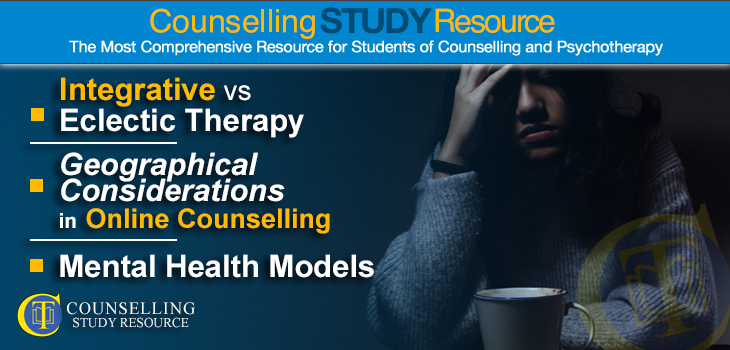178 – Mental Health Models
Integrative vs Eclectic Therapy – Geographical Considerations in Online Counselling
Episode 178 of the Counselling Tutor Podcast opens with a discussion between Rory Lees-Oakes and Ken Kelly about the differences between integrative and eclectic counselling. Then, ‘Digital Counselling Revolution’ looks at geographical considerations when working therapeutically online. Last, in ‘Practice Matters’, the presenters explain the three main mental health models.
Integrative versus Eclectic Counselling (starts at 1.30 mins)
A question was recently raised in our Facebook group about the difference between integrative and eclectic counselling. There is much debate on this in the counselling and psychotherapy profession.
Both approaches combine different modalities of therapy; Rory and Ken use the analogy of cooking to illustrate how they view the differences between integrative and eclectic counselling.
In integrative therapy, the client would not be able to spot the ‘joins’ between modalities – this is rather like combining a number of ingredients into a particular culinary dish.
Of course, this may or may not turn out to taste good. The chance of it tasting good is likely to be greater if the cook is reflective and has experience. Some counselling courses are integrative, and will train you in how to blend the various modalities that you are taught.
In eclectic therapy, the client would be able to detect that different approaches were being used – this is rather like presenting a selection of raw ingredients. This approach may be adopted by a therapist who has trained in one modality but has then gone on to add others at a later stage.
A third approach – which is receiving a lot of attention currently – is pluralistic counselling, which is about offering a range of approaches and supporting the client to choose which of these they would like to try.
If you feel drawn to add other modalities to your existing one(s), you may like to reflect on what draws you to do this, and the extent to which their underlying philosophies are consistent with each other.
Rory has produced a handout on the advantages and disadvantages of the integrative approach. You can download this here. We also have an article on integrative and eclectic counselling on our website.
Geographical Considerations in Online Counselling (starts at 14.55 mins)
One benefit of online counselling is that it can be done from a distance – this means that if a face-to-face client moves away, for example, it is possible still to continue working with them, so offering a lot of flexibility. However, this may apply only if you will still both be in the same country.
Different countries have different laws about counselling and psychotherapy, for example some European countries operate a system where certain job titles (such as ‘psychotherapist’) are protected.
Other countries (e.g. the USA) require therapists to be registered in the state where the client is living. There are even differences within the UK, between England and Scotland (e.g. on rules governing counselling related to adoption).
Another consideration when counselling a client from a distance away, even within the same jurisdiction, is your referral networks. If the client needs to be referred, will you know which organisations can help them?
Participants on our course, Online and Telephone Counselling – which has now trained over 10,000 therapists in online working – create a network of national agencies that enables you to do this confidently. The course is open to qualified practitioners or to students who are either in placement or about to start this.
Mental Health Models (starts at 28.30 mins)
Rory and Ken talk about:
- what mental health is
- the three key mental health models—medical, psychological and social
- what characterises each.
The World Health Organization defines ‘mental health’ as ‘a state of well-being in which an individual realizes his or her own abilities, can cope with the normal stresses of life, can work productively and is able to make a contribution to his or her community’.
Ken and Rory explain the importance of respecting each model of mental health, and of balancing them to fit each client’s individual needs. While counselling and psychotherapy fall into the psychological model, other models may be helpful to clients. As in many areas, balance is key.
Over time, those working with the three mental health models are increasingly coming together, as reflected in A New Vision for Mental Health.
You can find an article on models of mental health on the Counselling Tutor website; there is also a lecture dedicated to this topic in our lecture library.


